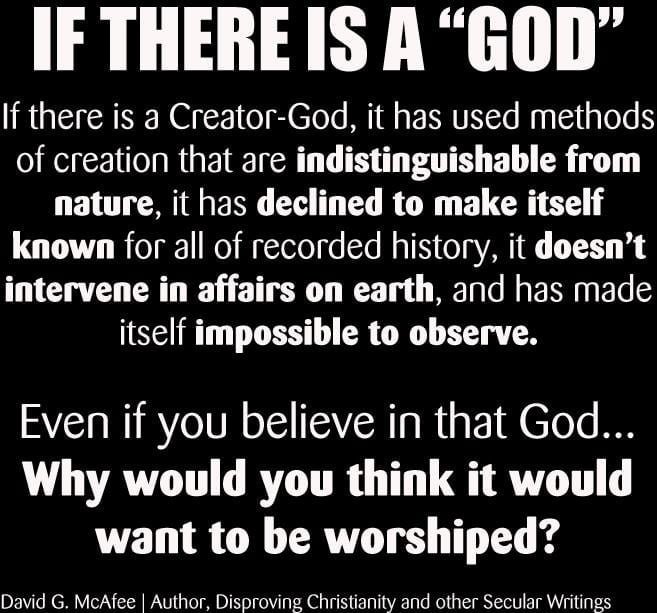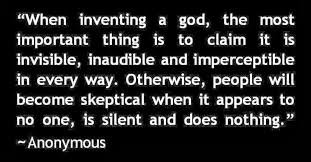
A recent episode of Hard Sun — a pre-apocalyptic British-American television crime drama series — featured a man who traveled overseas to do aid work. While there, he saw horrific atrocities. He rightly observed that in the midst of these atrocities, the Christian God was nowhere to be found. The man returned home and sought out a Catholic priest, hoping that this man of God could help him sort out his conflicted feelings. During the course of confession, the man admitted murdering a woman he didn’t know in cold blood. His motive? To see if God would stop him. God, of course, didn’t. The man went on a serial killing spree, telling the priest, “If God is there, let him stop me.”
Evangelicals speak of a personal God; a deity who is so concerned with the welfare of people that he knows the very number of hairs on their heads. This version of God is supposedly kind, compassionate and loving. This God is but a murmured prayer away, a friend who sticks closer than a brother or sister. Yet, when careful attention is paid to the plight of the human race, it seems that the Christian God is AWOL. While an argument could be made that all the suffering we see arises unbelievers getting their just deserts, many of those who face great travail and tragedy are followers of Jesus. Poverty, hunger, and homeless is rife among the children of God. Why is it that God is an absentee father, one who sits idly by while his children bleed, suffer, and die? This God is all-knowing and all-powerful, yet he turns a blind eye and a deaf ear to the groans of his creation. I could understand this if Evangelicals worshiped a deistic God; a deity who created the universe and then said to us, “there ya go boys and girls, do with it what you will.” If God is passive and non-involved, then I understand, but Evangelicals say God is very much hands-on; a deity who knows our thoughts, tears, and heartaches; a God who sees our pain and suffering. This God is a myth.
In 1 Kings 18:17-39, we find an interesting story about Elijah attempting to prove to the Israelites which deity was the true and living God:
And it came to pass, when Ahab saw Elijah, that Ahab said unto him, Art thou he that troubleth Israel? And he answered, I have not troubled Israel; but thou, and thy father’s house, in that ye have forsaken the commandments of the Lord, and thou hast followed Baalim. Now therefore send, and gather to me all Israel unto mount Carmel, and the prophets of Baal four hundred and fifty, and the prophets of the groves four hundred, which eat at Jezebel’s table. So Ahab sent unto all the children of Israel, and gathered the prophets together unto mount Carmel. And Elijah came unto all the people, and said, How long halt ye between two opinions? if the Lord be God, follow him: but if Baal, then follow him. And the people answered him not a word. Then said Elijah unto the people, I, even I only, remain a prophet of the Lord; but Baal’s prophets are four hundred and fifty men. Let them therefore give us two bullocks; and let them choose one bullock for themselves, and cut it in pieces, and lay it on wood, and put no fire under: and I will dress the other bullock, and lay it on wood, and put no fire under: And call ye on the name of your gods, and I will call on the name of the Lord: and the God that answereth by fire, let him be God. And all the people answered and said, It is well spoken. And Elijah said unto the prophets of Baal, Choose you one bullock for yourselves, and dress it first; for ye are many; and call on the name of your gods, but put no fire under. And they took the bullock which was given them, and they dressed it, and called on the name of Baal from morning even until noon, saying, O Baal, hear us. But there was no voice, nor any that answered. And they leaped upon the altar which was made. And it came to pass at noon, that Elijah mocked them, and said, Cry aloud: for he is a god; either he is talking, or he is pursuing, or he is in a journey, or peradventure he sleepeth, and must be awaked. And they cried aloud, and cut themselves after their manner with knives and lancets, till the blood gushed out upon them. And it came to pass, when midday was past, and they prophesied until the time of the offering of the evening sacrifice, that there was neither voice, nor any to answer, nor any that regarded. And Elijah said unto all the people, Come near unto me. And all the people came near unto him. And he repaired the altar of the Lord that was broken down. And Elijah took twelve stones, according to the number of the tribes of the sons of Jacob, unto whom the word of the Lord came, saying, Israel shall be thy name: And with the stones he built an altar in the name of the Lord: and he made a trench about the altar, as great as would contain two measures of seed. And he put the wood in order, and cut the bullock in pieces, and laid him on the wood, and said, Fill four barrels with water, and pour it on the burnt sacrifice, and on the wood. And he said, Do it the second time. And they did it the second time. And he said, Do it the third time. And they did it the third time. And the water ran round about the altar; and he filled the trench also with water. And it came to pass at the time of the offering of the evening sacrifice, that Elijah the prophet came near, and said, Lord God of Abraham, Isaac, and of Israel, let it be known this day that thou art God in Israel, and that I am thy servant, and that I have done all these things at thy word. Hear me, O Lord, hear me, that this people may know that thou art the Lord God, and that thou hast turned their heart back again. Then the fire of the Lord fell, and consumed the burnt sacrifice, and the wood, and the stones, and the dust, and licked up the water that was in the trench. And when all the people saw it, they fell on their faces: and they said, The Lord, he is the God; the Lord, he is the God.
Elijah, a prophet of Jehovah, challenged the prophets of Baal to a God-duel. Elijah and the prophets of Baal would each build an altar, stack it with wood, and put a slaughtered bullock on top. Then each of them would call on their God to send fire down from Heaven and consume their bullock. Elijah, ever the cocky Evangelical preacher, had his bullock repeatedly doused with water. Game on, Elijah said to the prophets of Baal.
First up were the prophets of Baal. From early morning until noon the prophet prayed, saying “O Baal, hear us,” but their God was silent. Elijah mocked them, saying: “Cry aloud: for he is a god; either he is talking, or he is pursuing, or he is in a journey, or peradventure he sleepeth, and must be awaked.” This only caused the prophets of Baal to cry out that much louder. They even went so far as to cut themselves with knives and lancets. No matter what they did, their God remained silent, making no attempt to prove her existence.
Then it was Elijah’s turn. Not content to make a simple four word request as the prophets of Baal did, Elijah prayed a sermon as Baptist preachers often do: “Lord God of Abraham, Isaac, and of Israel, let it be known this day that thou art God in Israel, and that I am thy servant, and that I have done all these things at thy word. Hear me, O Lord, hear me, that this people may know that thou art the Lord God, and that thou hast turned their heart back again.”
And sure enough, God sent fire down from Heaven and consumed Elijah’s sacrifice. The Israelites oohed and aahed, admitting that Jehovah was the one true God. Wanting to put an explanation point on the day’s events, Elijah had the 450 prophets of Baal rounded up and murdered. Ah, the God of peace, right?
Every time I think about this story, I am drawn to Elijah’s mockery of Baal. There were 450 prophets of Baal and only one prophet of Jehovah. Not good odds, yet the God of Abraham, Isaac, and Jacob won the day. (Just remember, Jesus only wants winners!) Why is the modern God of Christianity so different from Elijah’s God? As I listen to what Evangelicals SAY about their God, I see a huge disconnect between that and what their God actually does. Perhaps it is fair and right for us to mock this God as Elijah mocked Baal thousands of years ago. It seems to me that the Evangelical God is talking, pursuing (taking a shit), on a journey (vacation), or sleeping. Earth is a Find Waldo book without Waldo.
Evangelicals believe that Satan walks to and fro on earth seeking whom he may devour. He is the prince of earth, and by the look of things he is definitely kicking ass and taking names. Atheists such as myself mock the Bible and profane God’s name, yet the Christian God does nothing. Zealots tell me that someday God is going to get me; that when I die, I will find out how real God is; that when the flames of Hell bring me untold suffering and pain, I’ll finally know that the God of the Bible is the one true God. Idle threats, I say, idle threats.
There’s always a chance that I am wrong about the Christian God, but I’m persuaded that no such deity exists. Much like the man in Hard Sun, the extant evidence before me suggests that there is no God. If there really is a God, he knows where I am and he can, in his own good time, make himself known to me. Until then, I intend to keep pecking away on my keyboard, defending secular and humanistic values.
About Bruce Gerencser
Bruce Gerencser, 61, lives in rural Northwest Ohio with his wife of 40 years. He and his wife have six grown children and twelve grandchildren. Bruce pastored Evangelical churches for twenty-five years in Ohio, Texas, and Michigan. Bruce left the ministry in 2005, and in 2008 he left Christianity. Bruce is now a humanist and an atheist. For more information about Bruce, please read the About page.
Bruce is a local photography business owner, operating Defiance County Photo out of his home. If you live in Northwest Ohio and would like to hire Bruce, please email him.
Thank you for reading this post. Please share your thoughts in the comment section. If you are a first-time commenter, please read the commenting policy before wowing readers with your words. All first-time comments are moderated. If you would like to contact Bruce directly, please use the contact form to do so.
Donations are always appreciated. Donations on a monthly basis can be made through Patreon. One-time donations can be made through PayPal.

 A guest post by Paul McLaughlin
A guest post by Paul McLaughlin




